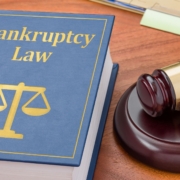Client’s often ask why can’t I just put my child on my bank account with me. One of the things that I’m looking at is, how do they own their assets, who actually owns their asset who is on their bank account, who is on the title to their real estate. Often I discover that a client will have an adult child on their bank account with them.
Why is your child on that bank account with you? Is it for convenience purposes? Is it if you’re in the hospital, or traveling, or need your child to pay bills, they can do so because they’re on the account?
There’s a lot of downsides unfortunately, to having your child on your bank account with you. The first one is liability. If your child gets into a car accident, get sued files, bankruptcy, maybe even files for divorce then your bank account could be subject to that child’s creditors or property distribution.
The second reason it’s a bad idea to have your child on your bank accounts with you is because it could affect your child down the road if they are applying for government assistance such as Social Security disability benefits, because they have access to, even though it’s not their money, your assets making them ineligible for benefits. The third reason it’s a bad idea to have your child as a co-owner of your bank accounts is you’re basically giving your child carte blanche to your money, they can go in do whatever they want to with your money. It’s going to be very difficult to get any money back if your child or to steal money from you, or otherwise, mishandle the funds, because you trusted him, you put him on the account, you gifted the value of the account. The fourth reason it’s a bad idea in a lot of situations to name your child as co-owner of your accounts is that when you die, the bank account continues to belong to that child. If you have multiple children, and the intent is to divide the account among all of your children, the child on the account does not have any legal obligation to share it with their siblings, even if your will says to do so the ownership of the account trump’s your will, and the money belongs to your one child who was co-owner of the account.
My job is to play devil’s advocate. They’re not going to share the money with their siblings in most cases. Assuming they did share and If it’s a large enough amount then that is considered a gift now from the child to their siblings, and they might have the burden of having to file a gift tax return with the IRS to disclose those gifts. If they later file bankruptcy, the bankruptcy trustee could go back void the transfers and force your other children to pay the money they received into the bankruptcy estate. How do you get around this? Remove your child from your bank account. Your child will have to agree to be removed from the bank account. Put the account back into just your name, sign a power of attorney, you can name that same child, giving them authority to help you out with your banking affairs. Give a copy of that power of attorney to the bank.
That child can now continue to pay bills on your behalf out of your account and help you manage the account. If you want to avoid probate of the account, when you die, sign what’s called a POD ( payable on death beneficiary form) with the bank for that account. List whoever you want to inherit the account upon your death, that might be the one child it might be all of your children. Some financial institutions call it TOD form (transfer on death form). By signing that form, you’re naming beneficiaries for the account. After your death, all the beneficiaries will need to do is present a death certificate and the account will be dispersed among all of your beneficiaries. If you have questions about this or anything else related to your estate, and you’re a Florida resident, I would be more than happy to handle your planning and answer your questions.
Carol A. Lawson, Esq., 28870 U.S. Hwy 19 #300, Hodusa Towers, Clearwater, FL 33761
Phone: (727) 410-2705; email: calh@gate.net
Clearwater Bankruptcy Attorney, Clearwater Bankruptcy Lawyer, Clearwater Bankruptcy, Clearwater Estate Planning Attorney, Pinellas Estate Planning Attorney, Pinellas Probate Attorney #FileLocallyDontOverpay #ClearwaterBankruptcy #ClearwaterBankruptcyAttorney #ClearwaterEstatePlanning #ClearwaterProbate
florida estate planning, estate planning attorney, carol a. Lawson attorney, florida family succession plan, florida, durable power of attorney, poa, florida durable power of attorney











